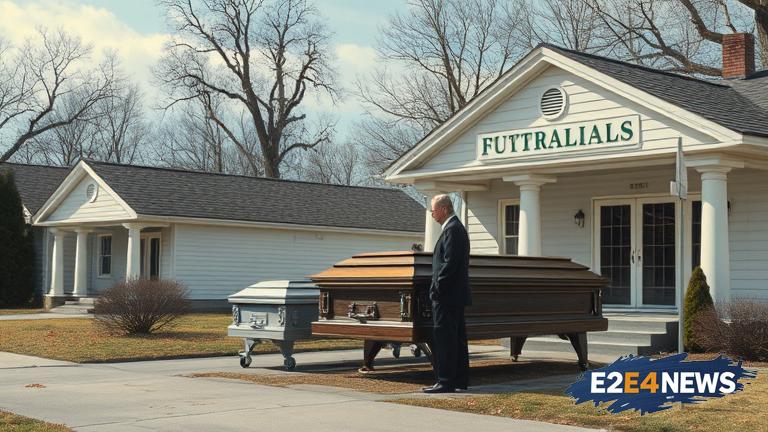A recent investigation by News5 has shed light on the surprising fact that Pueblo’s coroner owns a funeral home, raising questions about the frequency of this practice and its implications. The coroner, who is responsible for investigating deaths and determining cause of death, also operates a funeral home, which provides services for the deceased and their families. This dual role has sparked concerns about potential conflicts of interest, with some arguing that it could influence the coroner’s decisions and create an unfair advantage for their funeral home business. However, others argue that owning a funeral home does not necessarily compromise a coroner’s ability to perform their duties impartially. The investigation found that this practice is not unique to Pueblo, with many coroners across the country owning or having ties to funeral homes. In fact, a survey of coroners and medical examiners found that nearly 20% of respondents had a financial interest in a funeral home. This has led to calls for greater transparency and regulation of the funeral industry, with some advocating for stricter laws and guidelines to prevent conflicts of interest. The funeral industry is a multi-billion dollar market, with the average cost of a funeral ranging from $7,000 to $10,000. With such high stakes, it is essential to ensure that coroners and funeral homes operate with integrity and prioritize the needs of the deceased and their families. The investigation also highlighted the lack of standardized regulations and oversight, with different states and counties having varying laws and guidelines governing the relationship between coroners and funeral homes. This has created a patchwork system, where some coroners are subject to strict regulations while others are not. Furthermore, the investigation found that some coroners who own funeral homes may be more likely to recommend their services to families, potentially creating an unfair advantage. On the other hand, some coroners argue that owning a funeral home allows them to provide more comprehensive services to families and better understand the needs of the community. The issue has sparked a debate about the role of coroners and the funeral industry, with some calling for greater separation between the two. Others argue that the current system is working and that coroners who own funeral homes are able to maintain their impartiality. As the investigation continues, it is clear that the relationship between coroners and funeral homes is complex and multifaceted. While some may see it as a conflict of interest, others view it as a necessary part of providing comprehensive services to families. Ultimately, the goal should be to ensure that coroners and funeral homes operate with transparency, integrity, and a commitment to serving the needs of the deceased and their families. The investigation has also raised questions about the training and education of coroners, with some arguing that they should receive more comprehensive training on ethics and conflict of interest. Additionally, there are concerns about the lack of diversity in the funeral industry, with some arguing that it is dominated by a few large companies. The issue has also sparked a discussion about the role of technology in the funeral industry, with some companies offering online platforms for funeral planning and arrangement. As the funeral industry continues to evolve, it is essential to address these concerns and ensure that coroners and funeral homes are operating with the highest level of integrity. The investigation has also highlighted the importance of community involvement and oversight, with some arguing that families and communities should have a greater say in the funeral industry. Furthermore, there are concerns about the environmental impact of the funeral industry, with some arguing that traditional funeral practices are not sustainable. The issue has also sparked a debate about the cost of funerals, with some arguing that they are too expensive and that families should have more affordable options. In conclusion, the investigation has shed light on the complex and often controversial relationship between coroners and funeral homes. While there are valid concerns about potential conflicts of interest, it is also clear that many coroners who own funeral homes are committed to serving their communities with integrity. As the funeral industry continues to evolve, it is essential to address these concerns and ensure that coroners and funeral homes operate with transparency, integrity, and a commitment to serving the needs of the deceased and their families.
